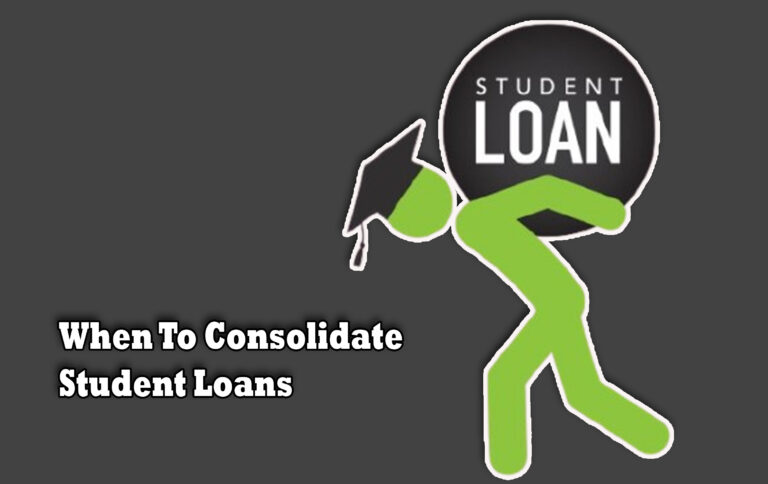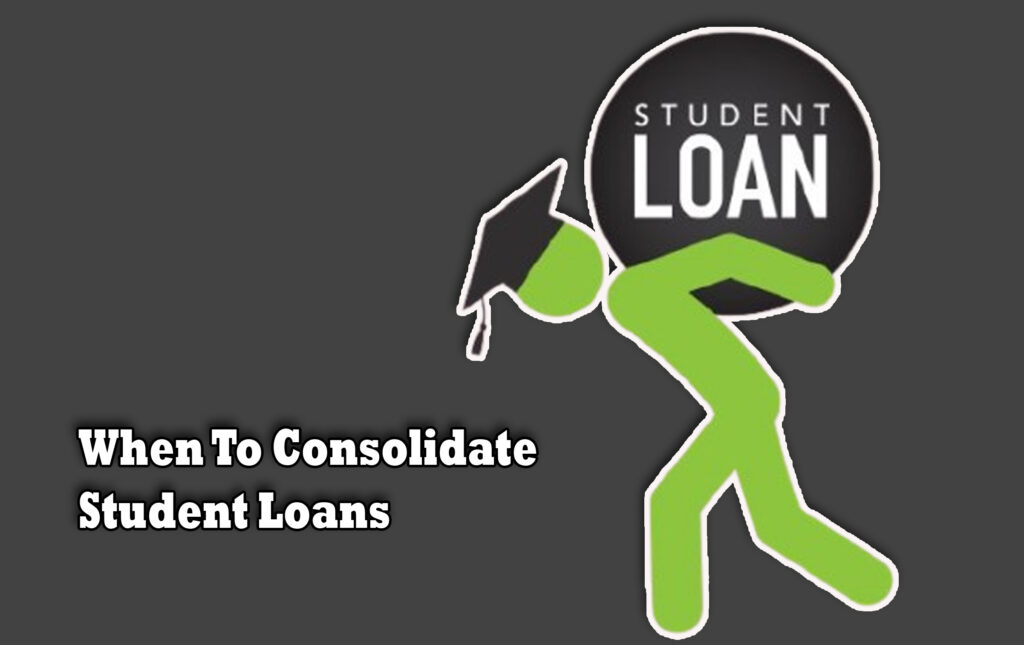
When To Consolidate Student Loans – Student loan consolidation is an important financial tool that can help simplify repayment, lower monthly payments, and provide access to additional repayment options.

However, consolidation is not always the right solution for everyone, and its timing can significantly impact the benefits you receive.
Whether you’re a recent graduate managing multiple loans or someone deep into repayment, it would be wise to fully understand the right time to consolidate.
Consolidating student loans involves combining multiple federal loans into one new loan with a single monthly payment. Now while this can ease the burden of managing various due dates and interest rates, it may also reset your repayment clock, affect loan forgiveness timelines, or increase the total interest paid over time.
What Is Student Loan Consolidation?
The Federal student loan consolidation is offered by the U.S. Department of Education and is only available for federal loans. Also, it combines multiple federal loans into a single Direct Consolidation Loan.
The new interest rate you get is a weighted average of the previous rates, rounded up to the nearest one-eighth of a percent.
On the other hand, Private loan refinancing, is offered by private lenders and can include both federal and private loans. Also, it may offer a lower interest rate based on your credit score but it eliminates federal protections.
So when considering consolidation, make sure you are looking at the federal consolidation process. This is because it maintains certain benefits like access to income-driven repayment plans and forgiveness programs.
When Is the Right Time to Consolidate?
The decision to consolidate should be based on timing, loan status, and your personal financial goals. There are key life stages and financial scenarios when consolidation might make the most sense.
After Graduation or Leaving School
Once you’ve graduated, left school, or dropped below half-time enrollment, you become eligible to consolidate your loans. What’s more:
- This is a good time to combine loans and begin repayment with a simplified structure.
- You may gain access to income-driven repayment plans or Public Service Loan Forgiveness (PSLF) options through consolidation.
- Consolidating too early may result in losing any grace periods you’re entitled to.
If You’re Pursuing Public Service Loan Forgiveness
To qualify for PSLF, only Direct Loans are eligible. If you have FFEL (Federal Family Education Loan) or Perkins Loans, you’ll need to consolidate them first. So:
- Consolidate before applying for PSLF to ensure all loans qualify.
- The sooner you consolidate, the sooner you can start making qualifying payments under a PSLF-eligible plan.
If You’re Having Trouble Managing Multiple Loan Payments
If you have several loans with different services, due dates, or interest rates, managing them can be stressful. So:
- Consolidation merges them into one monthly payment.
- It reduces the risk of missed payments or defaults.
- You may also qualify for extended repayment terms.
When Not to Consolidate Student Loans
Although consolidation offers many benefits, there are specific situations when it might not be ideal. Consolidating at the wrong time or for the wrong reasons can be costly in the long run. Here are some instances where you shouldn’t consolidate:
When You’re Close to Loan Forgiveness
If you’re already partway through a forgiveness program like PSLF or Teacher Loan Forgiveness, consolidation resets your payment count to zero. What’s more, you may lose progress you’ve already made toward forgiveness.
If You Have a Low Interest Rate
If your current federal student loans already have a low interest rate, them consolidating won’t lower your rate; it actually calculates a weighted average. Unfortunately, you could end up paying more over time, especially if you extend the loan term.
During Your Grace Period
You might want to wait until your six-month post-graduation grace period ends before consolidating. This is due to the reason that consolidating early causes you to lose the grace period. Instead, you can simply wait until just before repayment begins to benefit from the full timeline.
Key Considerations Before Consolidating
Even if the timing seems right, there are several important factors to weigh before consolidating your student loans:
- Loan Types: Only federal student loans are eligible for federal consolidation.
- Loan Benefits: You may lose borrower benefits such as interest rate discounts, principal rebates, or loan cancellation options on certain original loans.
- Repayment Plan: Choose the right plan when consolidating, especially if opting for income-driven repayment.
In hindsight, you can consult your loan servicer or a financial advisor before making the decision.
Frequently Asked Questions
Will Consolidating My Student Loans Lower My Interest Rate?
No, it won’t. The interest rate you get on a Direct Consolidation Loan is a weighted average of the interest rates on the loans being consolidated, rounded up to the nearest one-eighth of a percent.
So, it won’t reduce your interest rate, but it may lower your monthly payment by extending the loan term.
Can I Consolidate Private Student Loans Through The Federal Government?
No, unfortunately, you can’t. Private student loans are not eligible for federal consolidation. However, you can refinance private loans through a private lender, which may result in a lower interest rate if you qualify.
Knowing when to consolidate student loans is just as important as knowing why you want to do it. Whether you’re seeking simpler payments, qualifying for forgiveness programs, or planning your long-term financial future, consolidation can be a powerful tool as long as it’s done strategically.